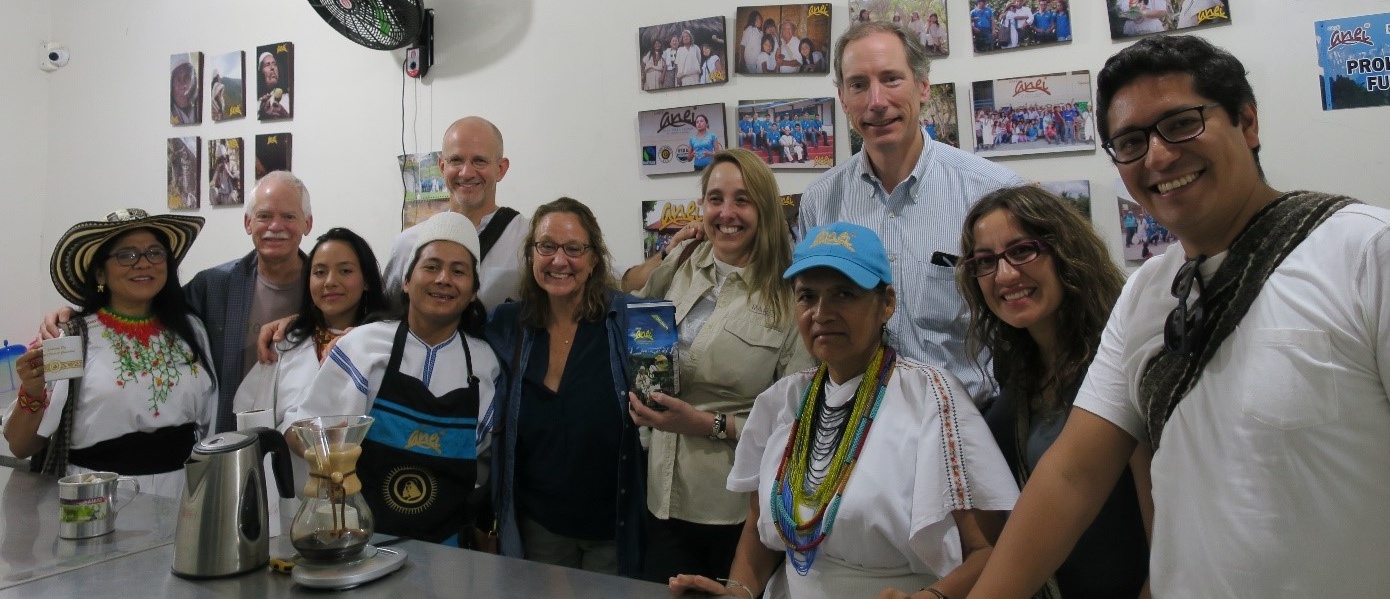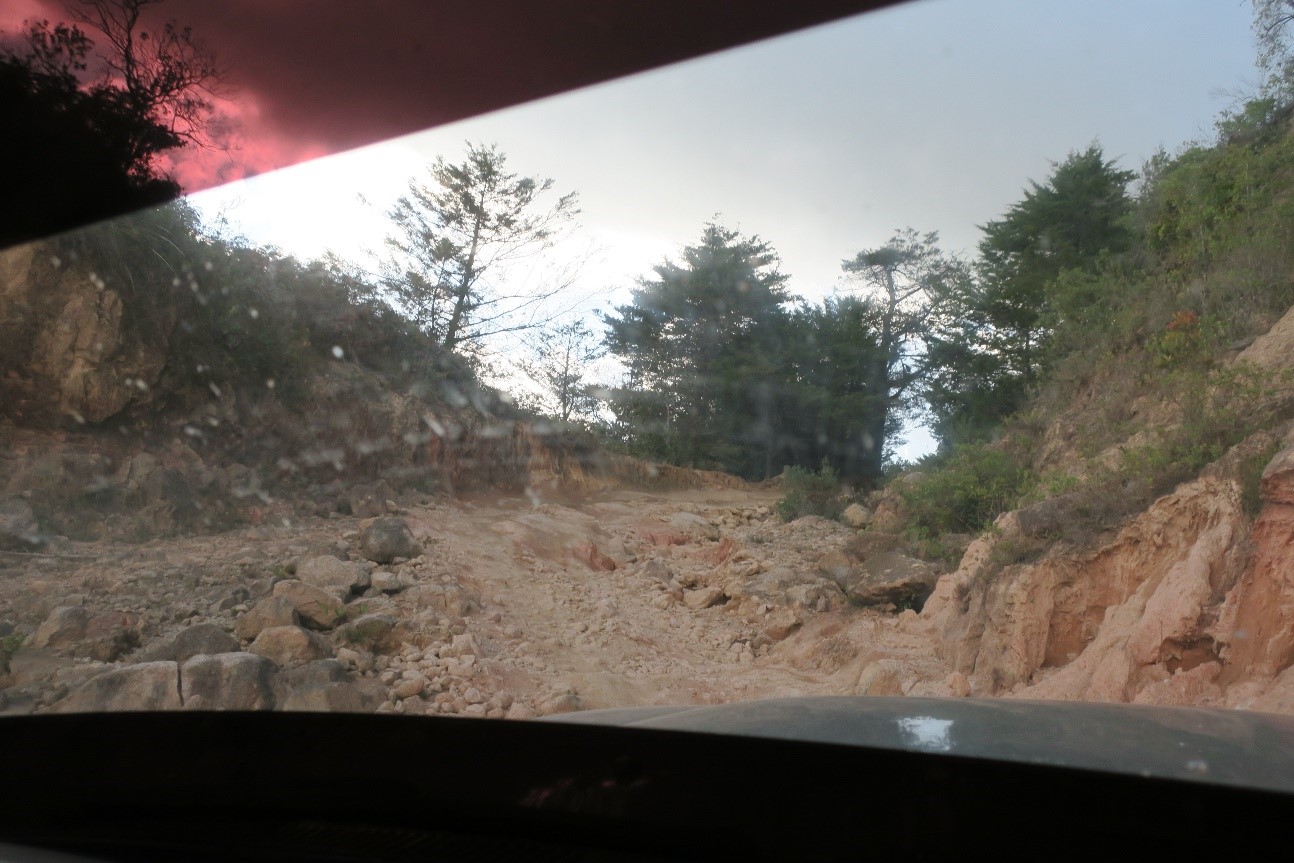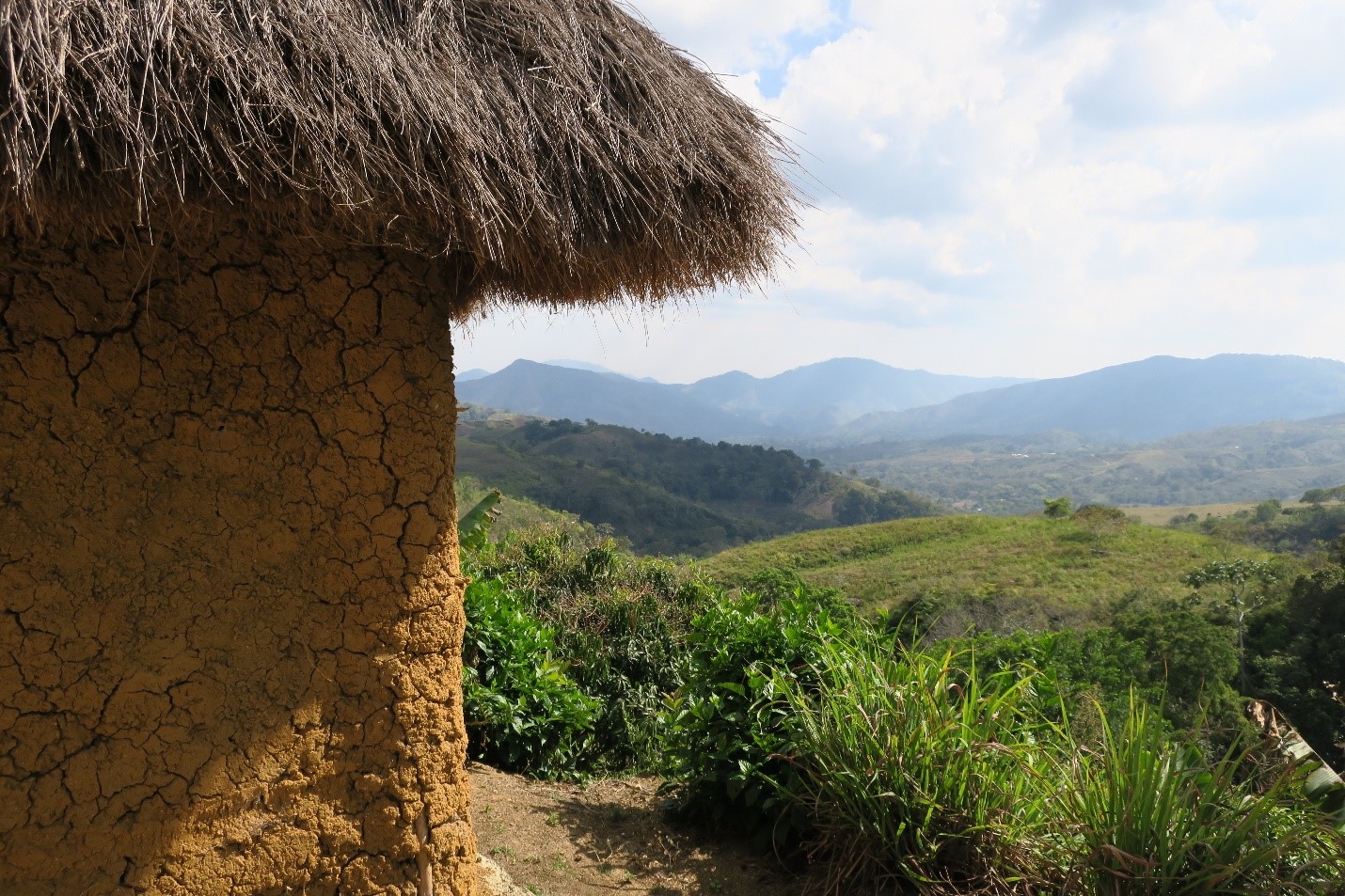
Root Capital board members and staff with the leaders of ANEI, a Fair Trade and organic coffee cooperative in Colombia
In late February, I joined a few members of Root Capital’s staff and fellow Board members in traveling to visit ANEI, a Fair Trade and organic coffee cooperative located in the mountains of northeastern Colombia, the Sierra Nevada de Santa Marta. The cooperative, which has been a Root Capital client since 2012, has 700 small-scale coffee farming family members from four indigenous groups – the Arhuacos, Koguis, Wiwas, and Kankuamos – each with a distinct language.
ANEI was founded in 1995 by Aurora Maria Izquierdo Torres (pictured above on the far left), who accompanied us on our 4+ hour trip from Valledupar to Nabusimake. Our first stop along the way was in the small town of Pueblo Bello. Here we briefly visited the cooperative’s offices, dry mill, and its cupping laboratory where the quality of its coffees are carefully evaluated.
Upon leaving Pueblo Bello, we continued our climb into the Sierra in our 1994 Toyota Land Cruiser on perhaps the most difficult road I have traveled on in my nearly 30 years in the coffee business. Rather than being “inconvenienced” by a bumpy washboard surface, our driver very slowly and carefully navigated the Land Cruiser on the steep “road,” over large rocks, avoiding boulders and deep crevices on both sides.

Navigating the treacherous road to Nabusimake
About 45 minutes later, we stopped in Jewrwa, a small community where we had the opportunity to meet with farmers, and have lunch in the midst of incredible mountain vistas.

Taking in the views from Jewrwa
After wrestling with the road for a couple more hours, we finally arrived in Nabusimake (Nah-boo-SEE-mah-kay), a stunning Arhuaco community set on a small plateau surrounded by majestic mountains. We stayed in the only guest cottages in the community, and walked to the village as the late afternoon sun descended behind the nearby peaks. When we arrived at the village gate, Aurora presented the villagers with fish, as an offering, and soon we were invited to enter.

Inside the Arhuaco community in Nabusimake
The mud or cement-walled homes with thatched roofs, lined the few narrow, large cobblestoned lanes in the village. We passed a couple of buildings that operated as small general stores, and a few larger buildings that served as meeting places. Many of the homes in the village are only used by ANEI members who live high in the mountains during village meetings. As we walked this village in gradually receding daylight, we all felt time slowing down. There were no street lights to guide us back to our guest cottages, only the light of the emerging stars, which were more prominent than those I regularly see in the sky above the northern Vermont countryside.
The community in and around Nabusimake is very well diversified, with vegetable gardens, citrus, livestock, all in addition to coffee production. Food security is one of the ANEI’s primary focus areas, along with environmental sustainability, cultural preservation, education and gender equity. While in the community, we visited both the local primary and the only secondary school in the region that provides students from distant communities with room and board.
Like other most coffee growing areas in Latin America, the ANEI communities are looking for opportunities for their young people. The land is communally owned, so as the older generation passes away, the land is subdivided by the next generation. The average size of land holdings is gradually shrinking to a point that farming is not economically viable, so young people are looking outside the community for other economic opportunities.

Nabusimake’s secondary school, which serves local students as well as those who come from distant communities who board at the school.
As climate change continues to push coffee production to the cooler temperatures found higher up the mountain slopes, cacao which prefers warmer temperatures, presents an option to replace earnings from coffee, particularly in the warmer, lower altitudes. ANEI is now working with cacao farmers, and is providing many young farmers with an opportunity to stay in the mountains, working a little lower in altitude on the same mountains that have supported their coffee-farming families for generations.
A video about the Arhuaco culture and community, produced by my organization, Lutheran World Relief, in late 2016.
Every day ANEI operates in an environment where a healthy tension exists between maintaining the strong indigenous cultures of the Arhuacos, Koguis, Wiwas, and Kankuamos, and engaging in the outer world. Can ANEI help these mountain communities preserve their cultures and improve their earnings and livelihoods, while trading with buyers around the world who have very different values? I think so.
Preserving the indigenous cultures is a priority for ANEI and the communities it serves. The secondary school curriculum, for those students fortunate enough to attend, has a strong emphasis on the native culture – a sincere effort to preserve this culture as members increasingly encounter the modern world through trade, cellular technology, or in other ways.
In the meantime, the community which is producing very high quality coffee, has one natural defense – the challenging road. We quickly learned that only small 4WD vehicles can climb the demanding road to Nabusimake. The road’s condition discourages most potential travelers from venturing very far up into the mountains. For the time being, this goes a long way in preserving the powerful culture and spectacular environment that is found in Nabusimake and other communities in the Sierra Madre de Santa Marta.
___________
Sign up to the Root Capital newsletter to stay up-to-date on the latest news and updates:
{{cta(’67e62212-06fb-4380-b6d3-b1bd3b7d90dd’)}}

What do you think?